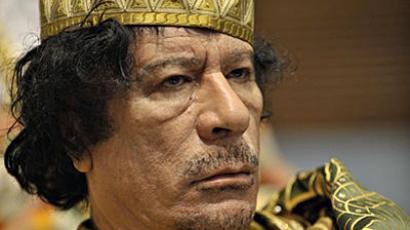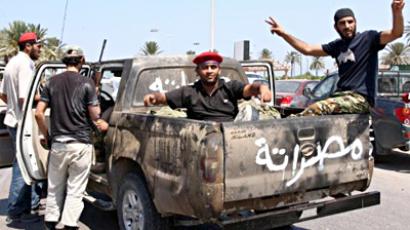New Libya should avoid pitfalls of Iraq and Afghanistan
As the Friends of Libya group prepares to gather in Paris, Moscow's special envoy Mikhail Margelov talked exclusively to RT about what may be in store for the country in the post-Gaddafi's era, and the future of its relations with Russia.
On Thursday, Russia recognized Libya's National Transitional Council as the country’s legitimate governing authority.Russian Senator Mikhail Margelov, the Russian president’s special envoy for Africa and chairman of the Federation Council’s Foreign Affairs Committee, believes Moscow is simply continuing its relations with Libya and with its people.RT: Mr. Margelov, some complain that Russia’s foreign policy is heavily influenced by various factors, whereas “progressive” countries straightaway supported the revolutionary forces, the opposition, the Transitional Council, etc. How would you respond to this criticism?MM: Our approach has never been to “wait and see.” Ever since world leaders approached President Medvedev in Deauville and asked him to help establish political dialogue between different parties in the Libyan conflict, our approach has never been to “wait and see.” Of course, unlike many of the “progressive” regimes you mention, we’ve had enough of revolution in our history. We prefer evolution. That’s why we are somewhat reluctant to throw our support behind revolutionary rhetoric. We understand clearly that slogans pass away and a tedious political process sets in. So, we are just doing our best to help start this quiet political process as soon as possible.RT: When did the Benghazi opposition give up the idea of negotiating with Colonel Gaddafi or his team?MM: As regards differences within the NTC, there have always been differences over political dialogue and negotiations. You always have some people who are more revolution-oriented and people who are less revolution-oriented. I have met those people, and I have to say I take them seriously. I like them and I have a lot of respect for them. Both in Tripoli and Benghazi, and in other capitals where members of the Libyan political elite reside – all these people belong to the same political elite that has emerged in Libya over the past 45 years. I don’t agree with the suggestion that the party that was in favor of political negotiations has suffered a defeat in Libya’s National Transitional Council. They will still have to negotiate towards national reconciliation after the fighting ends.RT:Mr. Margelov, Russia and the G8 spoke in favor of Colonel Gaddafi stepping down at the summit in Deauville. What does the future hold for Colonel Gaddafi?MM: We are probably not the ones who are best able to answer the question about Mr. Gaddafi and his future. It would be better addressed to the Libyan justice system and to international tribunals. Mr. Gaddafi has lost his legitimacy as a ruler and his right to be called the leader of his people when he ordered air strikes on unarmed civilians who were rallying to express political protest. We stopped regarding Mr. Gaddafi as a partner in negotiations when that happened. I would say Mr. Gaddafi will now determine his own future. He chose the hardest path, I would even say a suicidal path. He chose to make his supporters shed blood on his behalf until the last moment, while he remained in hiding. We do not know where he is presently, it could be Libya, it could be another country. Regardless of this, the position he chose is not one of a politician who thinks about the future. It is the position of a politician who is trying to save his own life. If Mr. Gaddafi is on the run, people will look for him and they will find him. The fact is a warrant for Mr. Gaddafi’s arrest has been issued by the International Criminal Court. It won’t be revoked. RT: And now a question about the political process we touched upon earlier. Do you think the Libyans will be able to reach some kind of balance, some common denominator, because the previous ones have been left in the past? Is there any other idea that will unite everyone, apart from toppling Gaddafi’s regime? MM: I think this government would only be successful if it encompasses the largest possible number of different Libyan political, religious, tribal, cultural and professional groups. In this case, I think the council would have to contact the royal family and the faction of the ruling elite in Cairo, led by Mr. Gaddafi’s cousin Ahmed Gaddaf al-Dam, who spoke strongly against Mr. Gaddafi’s policy of suppressing popular protests by force. They would also have to deal with various factions within the NTC, which is not a uniform organization but rather a colorful collection of various people and political groups, each with its own beliefs and interests. There are representatives of the tribal elites which, I think will be needed if national unity is to be established. There are also representatives of the intelligentsia and culture workers. I can’t mention any unions or similar institutions since over the past 40 years Gaddafi’s regime has succeeded in destroying anything that could be called a democratic institution by civilized standards. There are no institutions of that sort in Libya and they will have to be created from scratch.RT: Correct. The NTC stresses the importance of establishing political harmony between those numerous groups. Will this issue be resolved fairly? Will the groups put aside old grudges?MM: The Libyans are apparently in a more favorable position compared to those who had gone through the complicated multi-phased process of political restructuring before them. Libya can use the negative experience of Afghanistan and Iraq; it can draw conclusions from the hard times Egypt has survived and the less hard but still bloody past of Tunisia.I think the best way to accomplish this is to act responsibly right from the start, to bear in mind that the final decision on what Libya is going to become is one for the Libyan people to make, not the world's politicians who have been playing leading parts recently. The national democratic vote will determine this, and it should be well-prepared and duly carried out. This is where the international community, and Russia in particular, is eager to render active support to the Libyans. Those who think that the notion of Russian-Arab friendship is outdated and is passing away with the totalitarian regimes and dictatorships are bitterly mistaken. Nothing of the kind! I believe that the terms of Russian-Arab friendship and partnership are as up-to-date as they were 50 years ago.RT: Let us talk about the role Russia could play in Libya’s politics, economy and perhaps some other spheres. The old co-operation between Libya and the USSR, and the new partnership between Libya and Russia.MM: The first step Russia took as Libya's partner was to deliver humanitarian aid to the country during the military phase of the political conflict. We had talks with the leaders of the National Transitional Council in Benghazi and agreed that the interests of Russia would be respected in Libya after Gaddafi was toppled, that all contracts with Russia would be preserved and the interests of Russian companies respected. We are going to continue our active work in Libya. RT: According to earlier statements by the National Transitional Council, the new government will respect contracts concluded with the Russian Federation. But we also hear other statements, like the one made by one of the new heads of the Libyan Oil Company. He doubted Russia’s position during the voting on Security Council Resolution 1973, saying that Russia was more demanding than it should have been and that it was reluctant to show its support for the opposition. There is a possibility, he added, that some deals concluded with Russian oil companies operating in Libya will be annulled.MM: Oilfield workers on the board of a national oil company are in the first place professionals and not politicians. At the talks in Benghazi my counterparts expressed their gratitude to Russia for not torpedoing, not vetoing Resolution1973, for letting it be passed. This stance of the Russian Federation was highly appreciated by the National Transitional Council. That’s what matters. Russia has never silenced its commitment to Resolutions 1970 and 1973 and the Russian president signed a number of decrees in support of those two resolutions.The decrees clearly state that Russia will never give refuge either to Gaddafi or to his family or to his immediate subordinates whose hands are soaked with the blood of ordinary Libyans, will never support him or the forces loyal to him financially or supply them with weapons. And we have stuck to our commitments in full measure.RT:The West was consistent in supporting the revolutionaries whereas Russia, one could say, chose to stay away from Libyan affairs when the fighting began. Naturally, Western companies with interests in Libya will pursue those interests, possibly using the NTC to compete with Russian companies. The new Libyan authorities, in turn, may choose to work with them rather than Russian companies.MM: I hope you will excuse my question but what are revolutions made for? To gain access to oil and the money to be made from it? Hardly so. I heard the revolutionaries in Benghazi say – and I highly respect these words – that revolutions pursue the goal of making the people’s living conditions decent, modern, and normal at least, not miserable as it used to be. They let people know they are human and deserve to live as such. If a country wants its people to live in human conditions, it should maintain the balance of its political and economic interests. I have been traveling a lot in Africa, as a special representative of the Russian president, and I constantly hear African leaders complaining they are tired of one country's dominance, one bloc's dominance. They tell me they need a multi-polar political situation, a combination of different interests. The same is true for Libya. It won't be able to keep in line with the interests of just the European Union, or just the United States or the states of the Persian Gulf. Russia will always have its place in this varied and multi-colored picture. I think those Libyan politicians who will respect the national interests of their country, will without doubt consider co-operation with Russia.














